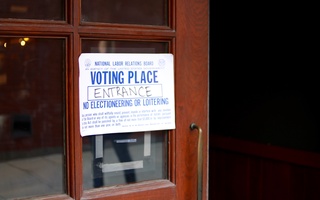{shortcode-8c82299fdadb00ed2513c368bec87d4e79eb3da7}
The National Labor Relations Board ruled to certify Columbia University’s graduate student union on Dec. 16—a decision some experts and graduate students say echoes and could affect ongoing unionization efforts at Harvard.
The ruling marks the board’s second decision in favor of student unions since it reaffirmed its commitment to mandating a new unionization election at Harvard on Dec. 12.
“We’ve been celebrating with Harvard here,” said Olga Brudastova, a Columbia graduate student and union organizer.
Columbia filed objections with the NLRB last December, arguing their election—in which eligible graduate and undergraduate teaching and research assistants voted in favor of unionization by a vote of 1,602 to 623—was invalid because of inconsistencies in voter ID policy and the presence of union agents at polling stations.
In its decision, the board noted that 647 challenged ballots were “an insufficient number to affect the results” of the Columbia vote.
Brudastova said having access to complete voter lists—a point of contention in Harvard’s own union election—contributed to the success of unionization at Columbia. Harvard graduate students previously charged that a voter list Harvard generated before the Nov. 2016 unionization election—the initial results of which showed more students voting against unionization than in favor—was inadequate in part because it excluded some eligible voters.
NLRB case law dictates employers must provide a complete and accurate list of eligible voters before a unionization election. University officials have said they believe the Nov. 2016 election was fair and that Harvard stands by the results of that election.
“I guess we were luckier than Harvard’s graduate workers in terms of Columbia’s cooperation with the NLRB process in getting the lists of voters,” Brudastova said. “These logistical details actually make a big difference.”
Harvard graduate student Nathaniel R. Braffman, a Columbia alumnus and Harvard Graduate Students Union-United Auto Workers supporter, said he was pleased by the NLRB’s ruling in favor of Columbia.
“I’m excited and eager to see a contract negotiated between Columbia's graduate workers and the university,” he said.
Columbia union organizers presented a bargaining request to Columbia University President Lee C. Bollinger’s office following the release of the NLRB’s decision, according to Brudastova.
But graduate student unions’ recent victories at Columbia and Harvard may prove short-lived. University of Michigan professor and labor law scholar Kate Andrias said the NLRB, whose five members are selected by presidential nomination, may not continue ruling in the unions’ favor after new appointments are made.
In particular, a Republican-led board would be likely to reverse its 2016 decision to recognize Columbia graduate students and teaching assistants as workers, Andrias said. That case set the most recent precedent for student unionization at private colleges and universities.
“We have no indication that, once there’s a full board, the underlying Columbia decision will be upheld,” Andrias said. “In fact, at least one of the board members—the new board members—is on record suggesting that he believes that decision should be reconsidered.”
Stanford law professor and former NLRB chairman William B. Gould IV said he thinks it is probable the board will overrule the Columbia precedent once President Donald Trump replaces outgoing chairman Phillip A. Miscimarra, whose term ended Dec. 16.
“I would imagine, given the unbridled approach to previous Obama board decisions, that the Columbia University decision will be a prime candidate for reversal, especially given that the board has gone back and forth on this for decades,” Gould said.
By NLRB procedure, Harvard can hold a second unionization election only after the remaining 195 challenged ballots from last year’s election are unsealed and counted, provided the final tally does not already certify the union. The regional NLRB has yet to set a date for the unsealing and counting of the final results of the 2016 election.
Gould said a reversal of the Columbia precedent before a second election would likely imperil the unionization effort at Harvard.
“There are a lot of imponderables here: how soon the new board member will get there, that’s one, whether he has some recusal problem since he’s been in private practice, that’s another,” Gould said. “All that we can say is, if and when the board is fully reconstituted, in this area as in others, unions will be in considerable difficulty. Timing is a big part of this.”
—Staff writer Shera S. Avi-Yonah can be reached at shera.avi-yonah@thecrimson.com.
—Staff writer Molly C. McCafferty can be reached at molly.mccafferty@thecrimson.com.
Read more in News
Journalist Win McCormack Endows New Kennedy School ProfessorshipRecommended Articles
-
 Labor Experts Foresee Long, Difficult Path to Student Unionization
Labor Experts Foresee Long, Difficult Path to Student Unionization -
Harvard: Drop the AppealUsing the University’s resources to deny graduate workers their democratic right to a free and fair election on unionization—whatever the results of that election—is a misuse of funds.
-
 Columbia Refuses to Bargain with Its Graduate Student Union, Possibly Threatening NLRB Precedent
Columbia Refuses to Bargain with Its Graduate Student Union, Possibly Threatening NLRB Precedent -
 Grad Student Unions Across U.S. Withdraw Representation Petitions
Grad Student Unions Across U.S. Withdraw Representation Petitions -
 Harvard Rep Declines to Say Whether School Will Bargain With New Union
Harvard Rep Declines to Say Whether School Will Bargain With New Union













